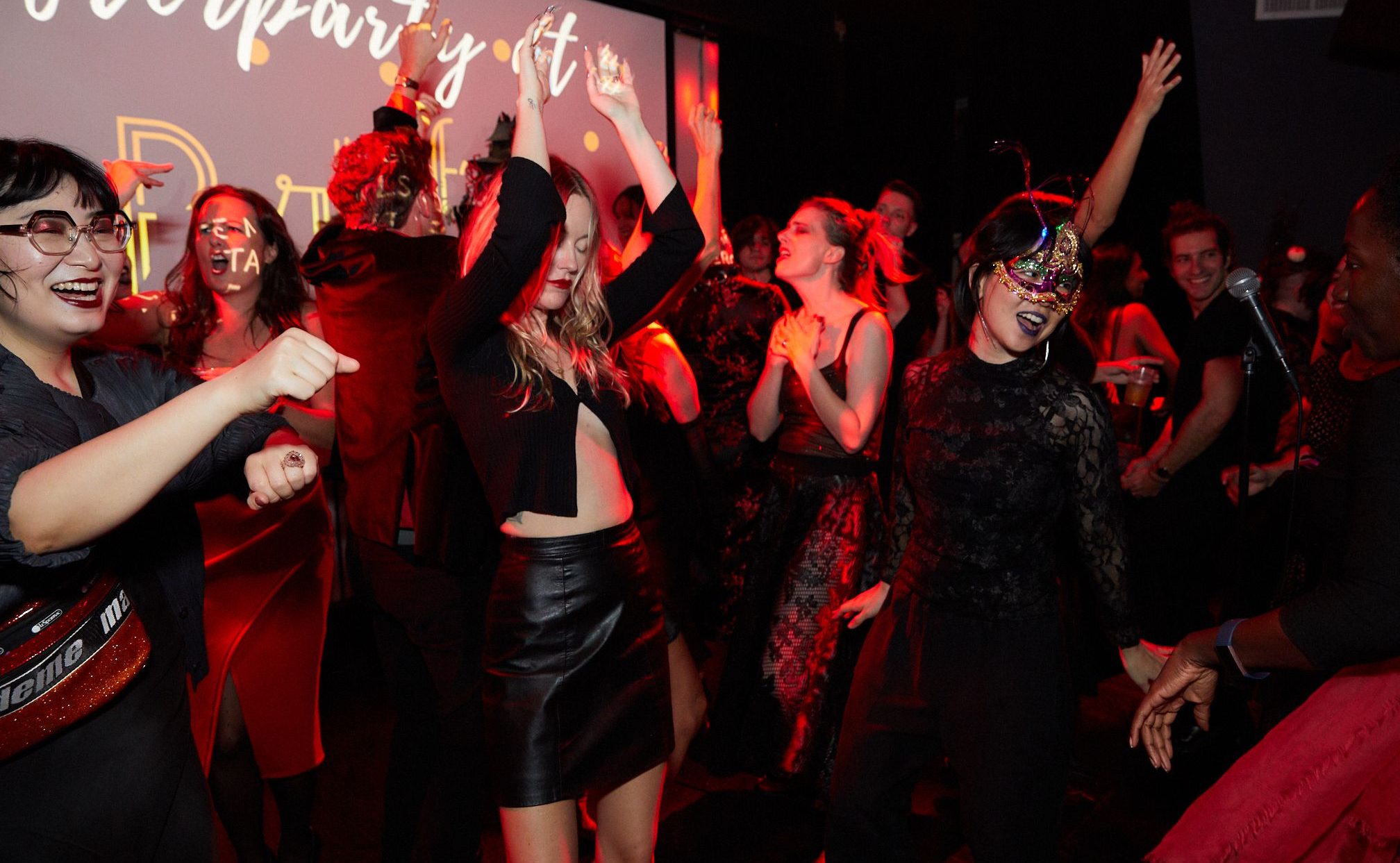Books & Culture
It’s Time to Radically Rethink Online Book Events
Instead of mimicking in-person events, virtual readings should make use of the possibilities of the internet

Before the stay-at-home orders came down in Baltimore, the last thing I did in person was participate in a panel conversation about—ironically—“art and the apocalypse.” In retrospect, we should have cancelled, but the threat in Maryland still felt surreal; those were the days when it seemed like we could beat the pandemic by washing our hands.
Internet readings have lacked some of the magic of human connection. Is there a way to recapture that magic online?
I’ve been thinking about that panel a lot lately because my first novel is coming out in August, and I’ve been trying to envision a book launch without an in-person event. I’m embarrassed to be grieving for this tiny problem, which is less than negligible compared to all we have witnessed this year. But publishing a novel has been a lifelong dream for me, and book events have been an important part of that dream—because other authors’ events have been such meaningful parts of my own inspiration. I have vivid memories of electric readings by Victor LaValle, César Aira, and Tim O’Brien. I got teary-eyed watching a hundred public school kids crowd in to see D. Watkins at the Baltimore Book Festival. After hearing Valeria Luiselli speak about The Story of my Teeth, I was so inspired I wrote an entire short story in an afternoon. When my dreams have felt far away, when my fiction has seemed meager and hopeless, I have gone to a bookstore and sat on a folding chair and been reminded that books are my spirituality—they are my connection to my own humanity, and to my understanding of grace in others. The magic of a book event is in the revelation, fresh every time, that my very favorite thing to do, a thing I do mostly alone, is also the thing that connects me most closely to other people.
As COVID has become our new normal, book events have started up again, in virtual formats. But like every other online substitute we’ve instituted—family Zoom calls, Instagram birthday wishes—these internet readings have lacked some of the magic of human connection. Is there a way to recapture that magic online?
For the first week of isolation, it was easy to imagine a return to normalcy. I think many of us saw ourselves emerging from a fourteen-day quarantine having drunk a little too much, maybe, but also having written King Lear. Personally, I did more drinking than writing. But I still felt optimistic.
By the third week, I had swung from denial to despair at the never-ending stream of news of illness and death, health care system failures and government malfeasance. The experience of these months reminds me of when I fall asleep on the couch watching a movie and then refuse to get up to go to bed. I know that I will feel terrible sleeping on the couch, but all I want to do is keep sleeping on the couch. My friend Nicole calls this feeling “special features,” because back in the days of DVD, she would demand her partner play the special features after the movie so that she could continue to sleep. By my fifth week of staying at home, I felt like I was living in special features.
To alleviate the loneliness, I found solace in online book events. Bookstores and literary festivals, podcasts and grassroots publicity efforts, and publishers and authors had intrepidly brought their work and energy online, gathering readers together despite the pandemic with heroic success. I went to more book events online in April than I have ever been to in a physical month; there were nights I hopped between three different conversations, from Zoom to Crowdcast to Instagram Live; it was like wandering through a literary night market, the tents all patchwork-stitched together but the doorways tacked open to warm, inviting fires inside. In those first three lonely months, wandering through this nightly market has been a comfort.
But lately, I’ve started to wonder why these events have not yet evolved. Most events are still following the old-fashioned format of the in-person bookstore event, where two authors have a conversation, maybe with a short reading, maybe with an audience Q&A. Rather than developing new ideas for book events to suit the technology we’re using, the literary community is by and large continuing to do what we’ve always done.
The internet rarely mimics the conventions of the physical world. So why are we still limiting book events to what is possible in person?
Don’t get me wrong—many of these events have been truly excellent. But the internet, which can be thrilling and inspiring and creative, rarely mimics the conventions of the physical world. So why are we still circumscribing book events according to the limits of what is possible in person?
These restrictions are not ideal for digital space. In bookstores, the “in conversation” model works because it gives you the inspiration of being in the same room as the author, as well as the excitement of being part of an audience. Neither of those translates organically to Zoom or Instagram Live, where it doesn’t really feel like you’re in the same room. And while there is often a chat box, or little hearts floating up the screen when people “like” something, the sensation of being part of the crowd is abstract. Without this sense of community, some online book events have left me feeling lonelier than I was before.
It’s time to start experimenting—and to try radically reinventing what a “book event” can be, in this radically different year.
I’ve started bringing this up with friends, looking for new ideas and possibilities of what an online book event can be. The general answer I’ve been getting is: Nobody knows! This is a new frontier, and it’s going to take a lot of playful experimentation to figure out what works. But as reopening plans falter nationwide, and it’s clear that gathering 30 or 50 people into a bookstore isn’t going to be a responsible choice anytime soon, it’s time that we start playing around.
I’ll go first. I’ve been throwing spitballs at the wall, and I came up with these nine ideas for ways an author could reinvent the book launch format:
- MTV Cribs: The author gives a tour of their workspace, from the desk where the book was written to the research library that inspired it to the corkboard string-map of characters to the spot on the floor where the author laid prone in despair. (Update: Baltimore’s Pratt Library and The Ivy Bookshop have been hosting a similar “Writer’s CRIBS” series since April!)
- Bookshelf Bingo: The author hosts a Bingo game based around a tour of their bookshelf, pulling out a selection of favorite works that inspired the new book. The first audience member who also owns a copy of four of the featured books hits bingo, and wins a prize.
- Pet Readings: Pets are the internet’s staple food; the author gives a reading from their book to their cat or dog (or, inspired by the Barcelona opera, their houseplants).
- Two Truths and a Lie: In each round of this game, the author makes three statements about the book, only two of which are true; the audience guesses (in the chat box) which is a lie.
- Short Film Festival: The author curates a YouTube playlist of videos related to the book—movie clips, interviews, classroom science films, news footage, home movies—and screens the playlist live, offering running commentary and answers to audience questions in a chat box alongside.
- Wildly Unprofessional Powerpoints: Several authors host a raucous, high-energy online lecture showcase—telling stories or explaining topics of interest to their books, alongside screenshared powerpoints (perhaps in the model of the Drunk Education series in Brooklyn or Trampoline Hall in Toronto).
- Live Cooking Class: The author shares a recipe (or cocktail) that has some connection with the book, then makes the dish or cocktail on a livestream platform. It might be fun if the audience has a couple of days to gather ingredients, so they can cook (or drink) along with the show.
- Google Documents Editing Tour: The author shares a Google Document that shows early drafts of the book, pointing out specific changes and talking about their editing process. (This is obviously for truly hard-core craft nerds only).
- Virtual Book Signing: With the support of a moderator/gatekeeper, the author takes 5-minute individual video calls with people who have purchased the book. Similar to the few moments you get at the front of a real book signing line, this is a chance to ask a question, or give the author a compliment, before getting your book “signed” (the author writes a bespoke message for the reader on a piece of paper, then holds it up for a screenshot—it’s a selfie AND a signature in one!).
If we start playing with these tools, we can make online ‘readings’ feel like their own kind of event rather than a substitute.
This list is just a first draft. Some of these ideas probably won’t work at all. Others will be more comfortable for some authors than others, and not every book will have a natural tie-in to these ideas. The point, though, is that we need to start thinking outside the “in conversation” box. Online events don’t have to feel like placeholders for the “real” thing while we wait for an increasingly far-off return to crowded rooms. The internet offers incredible varied tools for storytelling, playing, creating meaning, and connecting. If we start playing with these tools, we can make online “readings” feel like their own kind of event rather than a substitute, offering experiences that aren’t possible in physical space.
It’s important to note that all online events come with real safety concerns, which can be a serious barrier to experimentation. The flood of attacks from racists and bigots has made many bookstores and authors rightfully cautious about online events; it is especially infuriating because the attacks mainly hurt people of color, LGBTQ+ people, immigrants, and so many others who have too rarely received their deserved publishing deals and attention. I’m grateful for and impressed by the work many have done in developing effective ways to block trespassers; as we experiment with new formats, security measures are a non-negotiable prerequisite.
I hope we can deepen and extend the literary community through online events, not just keep it afloat. The writer and critic Maris Kreizman wrote on Twitter that she hopes “any author tour, no matter how many cities are on the agenda, will also have a live digital element” because livestreams are so much more accessible. It’s not a perfect solution—for one thing, there are still far too many people without access to computers or the internet at home—but online events are a big improvement for people with disabilities and chronic illnesses, those caring for children, those in rural or poor areas without bookstores, and others with countless barriers to weeknight events.
The more we can make online experiences exciting and engaging, the more we can cement an enduring tradition of truly accessible events.
Innovation is part of the push for universal access—the more we can make online experiences exciting and engaging, the more we can cement an enduring tradition of truly accessible events. And we can also open the door to people who might never walk into a bookstore. In 2017, the artists Yara Trevieso and Bridghid Greene performed La Medea—a musical dance performance designed to be experienced over livestream, with live audience voices in the role of Greek Chorus—on the Twitch platform. The artists found Twitch attracted entirely new audiences to their work: “… [it was a] major turnout in viewers that were predominately male watching a hyperfeminist musical.” Maybe—if we get this online thing right—book events can attract new audiences, too.
I started this essay by describing a March panel conversation about art and the apocalypse. But I didn’t tell you how that event turned out.
Nobody came! The panel went great, except for the fact that we had no audience. We talked about art, hope, feminism, and the future, in an empty auditorium. In the old days, that event would have felt like a failure. In the context of COVID, it felt strange and kind of magical, like something that would happen in a novel. It was my moment of realization: Talking about the apocalypse, to an apocalyptically empty auditorium, I was faced with the fundamental change sweeping the globe.
In the past few months, I’ve gathered hope from the ways our art and literature is shifting to reflect and respond to these new times. I’m looking forward to seeing all the ways our literary events evolve.








